Trump's outgoing intelligence chief streamlined the intelligence community's bureaucracy, but politicized its work
WASHINGTON — Ambassador Richard Grenell’s brief tenure as acting intelligence chief came to a close Thursday with the Senate confirmation of a permanent successor, leaving behind an ongoing controversy over his decision to declassify documents on the unmasking of former national security adviser Michael Flynn, but also what some consider a laudable effort to reduce a bureaucracy that has grown substantially since 9/11.
The Senate voted on Thursday to confirm Republican Rep. John Ratcliffe of Texas to be the new spy chief, responsible for coordinating the 17 intelligence agencies. Ratcliffe replaces Grenell, whom President Trump made temporary director of national intelligence on Feb. 19 even though Grenell was concurrently serving as the top U.S. diplomat in Berlin.
Known for his loyalty to Trump and his colorful and sometimes offensive Twitter presence, Grenell will leave the job he held for several whirlwind months with a mixed record, current and former national security officials tell Yahoo News. Many say that despite serving in a temporary role, Grenell deserves credit for making long-needed changes to an agency that’s become bloated in recent years. They worry, however, that he has politicized the intelligence community, deepening a tendency toward low morale.
Grenell, through a spokesperson, declined to be interviewed.
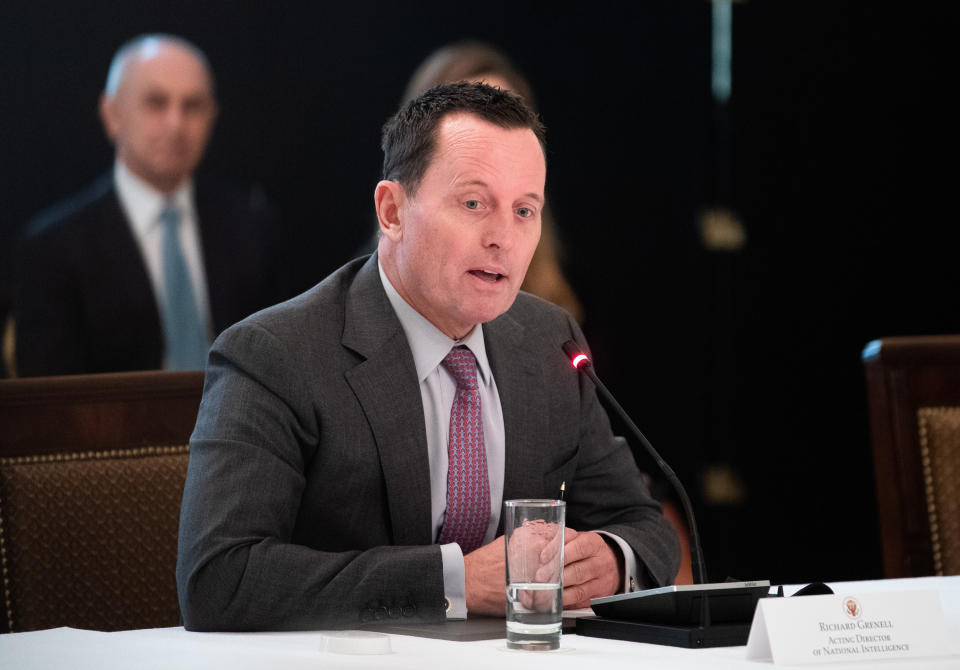
“I believe people anticipated the ambassador was going to come in with a hammer, but I think he came in with a scalpel to make some changes that he thought were important to make,” said Chris Costa, executive director of the International Spy Museum and a former counterterrorism expert on Trump’s National Security Council.
As recently as last Friday, Grenell announced organizational changes to both the election security briefing process and the National Counterterrorism Center, organizing the election security briefings under a single leader, counterintelligence chief Bill Evanina, and streamlining offices and roles within the counterterrorism office. Earlier in May, he eliminated the office’s directorate of national security partnerships, created a new role for the office to liaise with the military and established a single intelligence community “cyber executive.”
Sources who spoke about those moves to Yahoo News mostly expressed cautious optimism about these changes, though several said they feared for their jobs and the overall stature of the post-9/11 coordinating intelligence agency as a result. Costa, a long-serving retired intelligence officer, said he believed the changes to the National Counterterrorism Center seemed “very reasonable.”
One congressional source noted that streamlining the election security briefings could be a good thing, as long as the intelligence presented isn’t sanitized by the administration — a fear allayed at least somewhat by the solid reputation of Evanina, a national security career veteran. Additionally, sources say employees whose roles are cut at the National Counterterrorism Center will be sent back to their original agencies, where they’ll continue to focus on their areas of expertise.
Tracy Walder, a former CIA officer specializing in counterterrorism, told Yahoo News that she was concerned not with the specific changes made to the agencies but rather with the impression made by the changes. “Even if you’re just taking away a few people, you’re releasing a press release publicly that tells the American public that you don’t deem this as a threat anymore.”
Grenell has also been quick to declassify information, normally a positive for transparency advocates. The Office of the Director of National Intelligence’s annual transparency report, a granular look at the intelligence community’s use of surveillance powers established under its former head James Clapper, was published under Grenell’s watch in late April. Additionally, Grenell’s agency published a statement dismissing unscientific conspiracy theories purporting that the coronavirus was an engineered bioweapon unleashed in China.
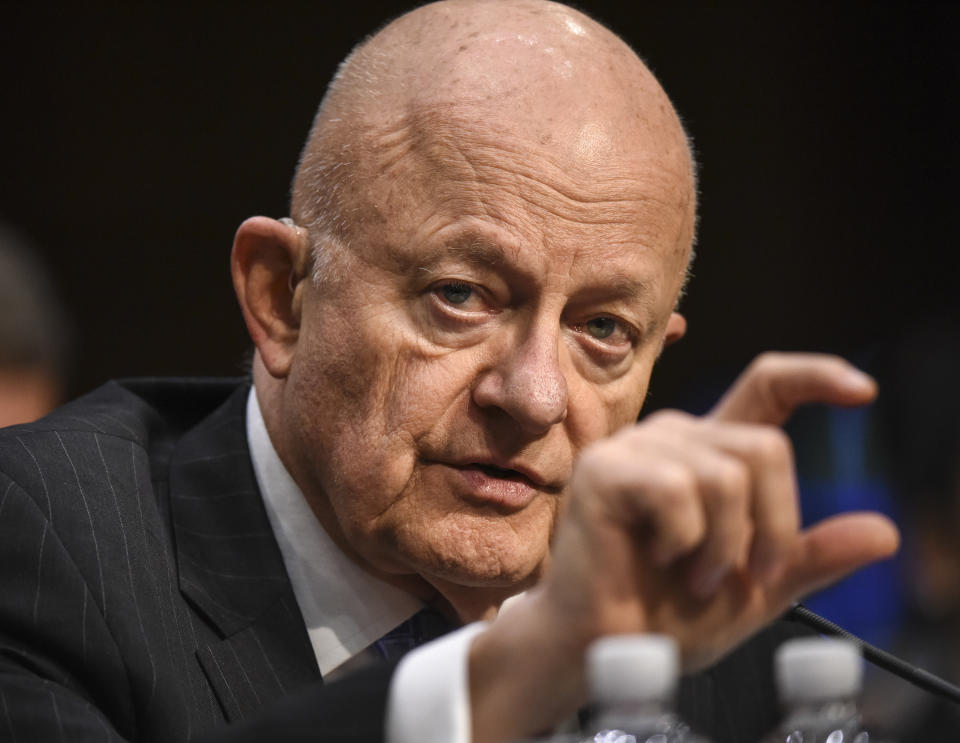
So far, Grenell’s office has not published any statements or analytic assessments unsupported by intelligence or in defense of Trump’s arguments that China and the World Health Organization are wholly responsible for the outbreak. One national security official told Yahoo News that reported White House efforts to push the intelligence community to blame China, a virology lab in Wuhan and the World Health Organization for negligence in starting the coronavirus outbreak “might have died on the vine, thankfully.”
However, national security experts balked at what looked like a political decision on Grenell’s part to unveil the names of Obama officials who sought to “unmask” retired Army Lt. Gen. Michael Flynn’s communications with foreign officials, a fairly routine process whereby names of Americans swept up in counterintelligence investigations are revealed to officials so they can understand a possible national security threat.
Grenell had raised questions about the investigation into Flynn early in Trump’s time in office, while Grenell was vying to be tapped as U.S. ambassador to NATO, and his recent decision to use his new authorities to get involved in that controversy crossed a line for those who may have given him the benefit of the doubt.
“His desire to institute reforms in the Office of the [Director of National Intelligence] were not necessarily political,” said Marc Polymeropoulos, a former senior CIA operations officer. “They were long sought after and are welcome by many in the [intelligence community].”
But Polymeropoulos said Grenell had “injected partisan politics” into the intelligence community by helping Attorney General William Barr declassify names of Obama-era officials who “unmasked” Flynn. “It was unnecessary and clearly politically motivated,” he said of the declassification.
“Grenell’s tenure will certainly be seen historically as muddy and mixed,” he said.
If Grenell is an unlikely reformer of the intelligence community, so is his ascension up the ranks of the Republican Party at a time when being openly gay has been a liability.
In 1992, he found his way to the Bush-Quayle reelection campaign, a first shot at breaking into Washington and, ultimately, his first loss, when Bill Clinton won the presidency. But Grenell was persistent, returning to Washington as a spokesman for freshman Rep. Mark Sanford of South Carolina.
In a 1995 Washington Post profile, Grenell was described as a “young, idealistic, passionate” Republican and Christian celebrating the long-awaited win of the House for the GOP. At the time, he professed his admiration for “strong women” and Democrats, including Hillary Clinton and Rep. Susan Molinari of New York. The Post described him as “ambitious,” with his eye on the job of White House press secretary.
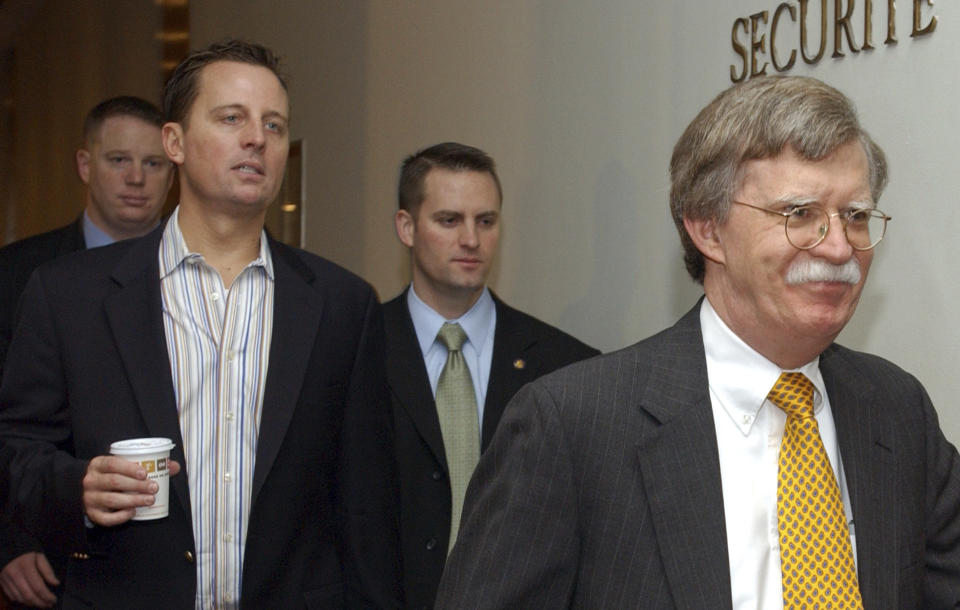
His big break came at the United Nations in 2001. He served as spokesman for eight years and for four different U.S. ambassadors to the international organization, including John Negroponte, who would later become the first director of national intelligence, and John Bolton, Trump’s ousted national security adviser.
Grenell’s tenure at the U.N. spanned the U.S. invasion of Iraq and the ill-fated search for weapons of mass destruction following the 9/11 terrorist attacks. At the U.N., he had access to some sensitive information and intelligence briefings, though there were debates about whether his level of experience was sufficient to allow him to take the reins of the entire intelligence community.
The top intelligence official is “supposed to have significant national security expertise,” said Cindy Otis, a former CIA analyst and author of the forthcoming book “True or False: A CIA Analyst’s Guide to Spotting Fake News.”
A temporary director is “meant to keep the seat warm,” she said. Without congressional confirmation, someone in Grenell’s position would normally be “very reluctant to make huge decisions that could result in loss of life, degradation of capabilities or shifting focus.” Lawmakers tasked with oversight of the intelligence community, including the chair of the House Intelligence Committee, Adam Schiff, a Democrat from California, have protested Grenell’s failure to coordinate with Congress on major organizational changes to the bureaucracy.
After the U.N., Grenell was appointed to Mitt Romney’s presidential campaign as a spokesman on national security and foreign affairs. However, his brief time in that role was clouded by lewd tweets making fun of women like Hillary Clinton and MSNBC host Rachel Maddow, as well as by backlash from far-right conservatives against Grenell, who was by then openly gay.
Two weeks after being appointed he left the Romney campaign, later explaining that he felt he could not focus on the issues he cared about without the distraction of his personal life. “The right I’m very comfortable with, taking those hits and barbs, because I've had a 20-year career where I’ve worked for politicians, I've worked on elections, on campaigns, and I know exactly the trajectory of the assaults from the far right,” he told a journalist from the Desert Sun.
The Trump administration finally gave Grenell a chance to serve in a Republican administration as the ambassador to Germany. After his nomination was held up for many months in Congress, he finally made his way to Berlin, where he also served as Trump’s special envoy for peace negotiations between Serbia and Kosovo.
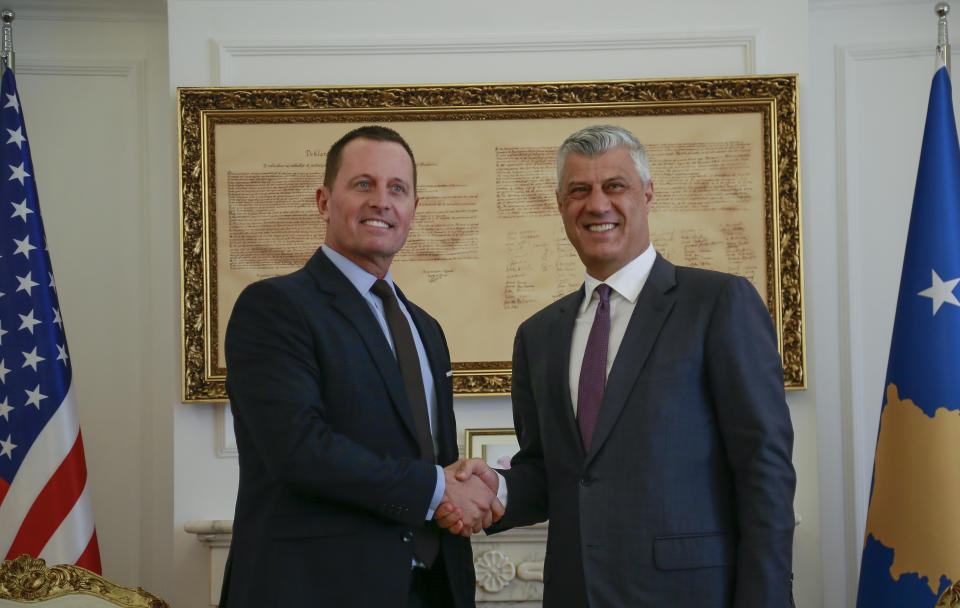
While in Germany, he reportedly made few friends, thanks largely to his disregard for diplomatic norms and pushing for Trump priorities like increasing NATO spending from allies, but also for criticizing other countries’ antigay policies. He also received some plaudits for helping to ease escalating tensions between Balkan rivals Serbia and Kosovo.
When Grenell’s name began surfacing as a potential nominee for several top jobs in the Trump administration, including the director of national intelligence, some in the national security community were wary, given his reputation and close relationship with Trump.
One former colleague noted that Grenell’s background, including his work with foreign clients, has yet to receive the full legal scrutiny it deserves. CNN reported that he previously touted his work for officials in Iran, China, Hungary and others, but later scrubbed that experience from his personal website before joining the Trump administration.
“His appointment — and current trajectory through Donald’s ranks — is horrifying,” said the former colleague, who requested anonymity to discuss their candid impressions of Grenell with Yahoo News. “He shouldn’t be trusted with a password for the conference room Wi-Fi, let alone the intelligence community.”
Trump had already begun his evisceration of senior leadership at the Office of the Director of National Intelligence — an organization he wanted to eliminate or neuter in the early days of his administration.
The role of director of national intelligence was created following recommendations by Congress in the aftermath of the terrorist attacks of Sept. 11, 2001, in order to increase communication among the intelligence agencies and avoid future attacks. While many intelligence experts admitted that increased communication was vital, some, including Gen. Michael Hayden, who served stints as the director of the NSA and the CIA, pushed back at the creation of the office, arguing it would do little intelligence work beyond installing additional layers of bureaucracy.
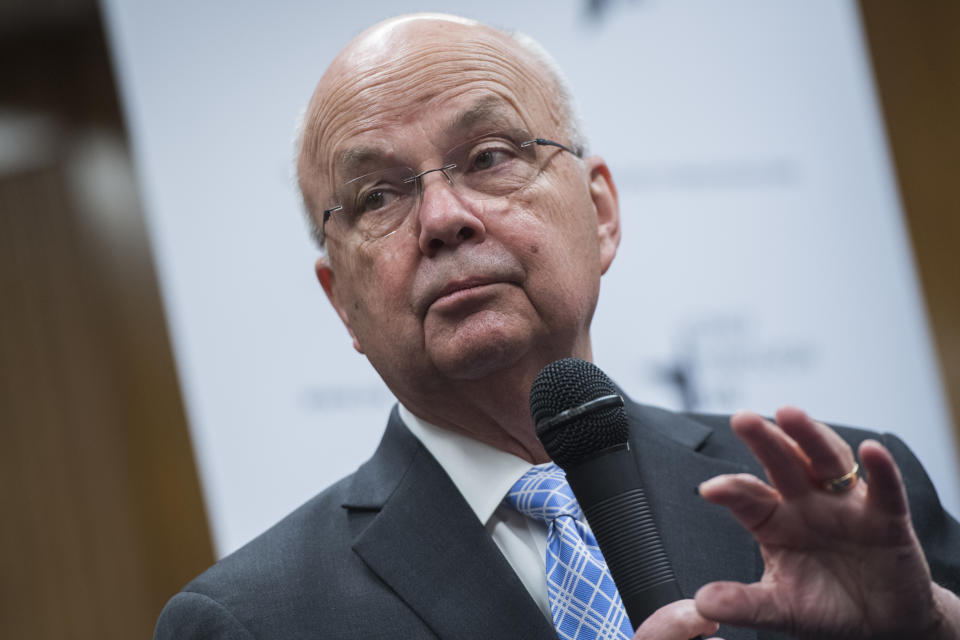
“There were few in the intelligence community at the time who thought that restructuring was a good idea,” Hayden wrote in his memoir, “Playing to the Edge.” “I certainly did not.”
Hayden later changed his mind, but said it would work only if the right people were selected to lead. “Good people overcome imperfect structures,” he wrote.
Since its creation, the office has grown in size and function, playing an important role both in the intelligence community’s leadership and budget and in communicating with both the public and the president. Even so, almost every intelligence and national security expert admitted that the agency could use reform and restructuring.
“Eliminating offices that were duplicative to other [intelligence community] entities, and shrinking the size of the [Office of the Director of National Intelligence] to streamline and make more effective the organization, are all positive steps,” said Polymeropoulos.
Former intelligence chief Clapper told Yahoo News he was unsure how to predict how Grenell’s reforms would ultimately play out. “Anytime there’s a reorganization, it’s almost impossible to know what the effects are until some time has elapsed under the new arrangement,” he wrote in an email.
However, in a previous email exchange with Yahoo News, he warned that Grenell’s appointment marked a “dark time” for his former agency given that he was the “third” person to hold the temporary role leading the intelligence community, making it difficult to establish “continuity and stability.”
Perhaps most damaging has been the ongoing erosion of morale: Some of the workforce has left or is planning to leave as a result of continued attacks from the White House and increasing politicization, one source told Yahoo News.
The summertime firing of Grenell’s predecessor, Dan Coats, a former top Republican lawmaker, and his deputy Sue Gordon, an intelligence veteran of several decades, was an “inflection point” that led many at the top coordinating intelligence agency to wonder “where the bottom is,” explained one source in contact with many currently serving.
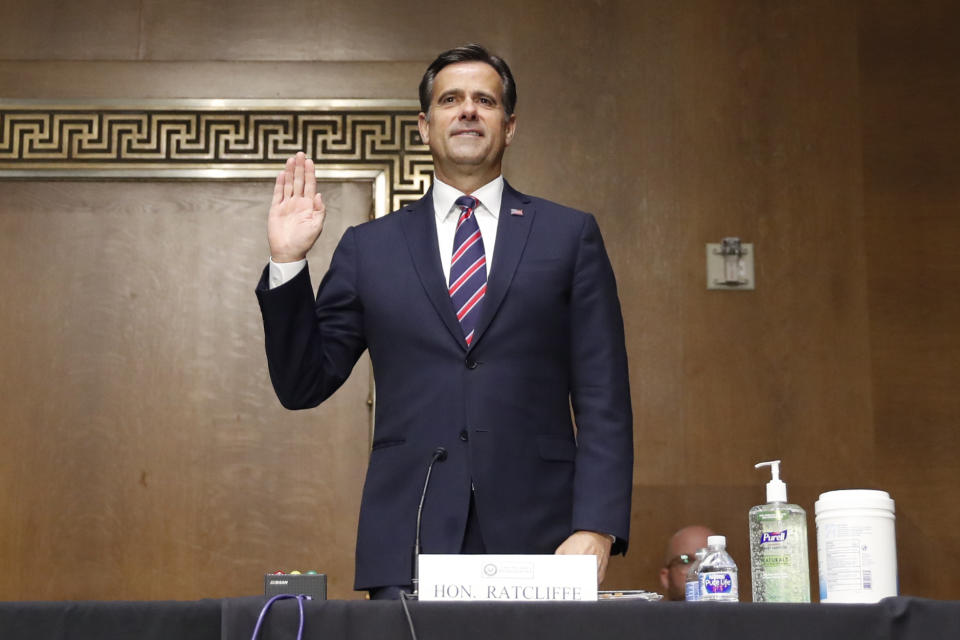
With Grenell, who is expected to remain ambassador to Germany, now turning over the reins to Ratcliffe, concern for those inside the intelligence community is what comes next. People who were suspicious of Grenell see Ratcliffe as someone who will be an instrument of Trump’s ongoing agenda.
“Morale is through the floor,” said another current national security official. “It has been for a while.”
_____
Click here for the latest coronavirus news and updates. According to experts, people over 60 and those who are immunocompromised continue to be the most at risk. If you have questions, please refer to the CDC’s and WHO’s resource guides.
Read more:


